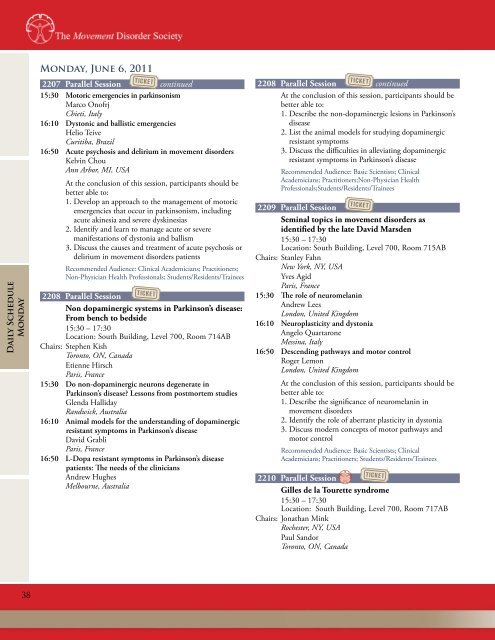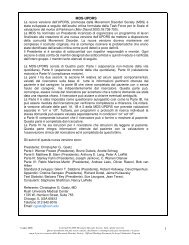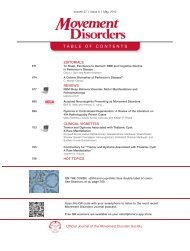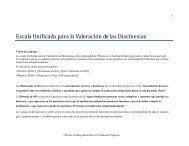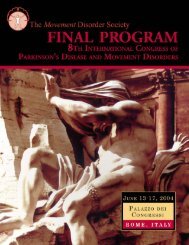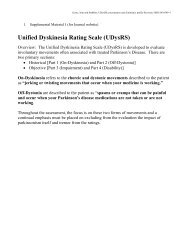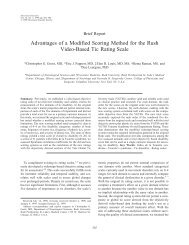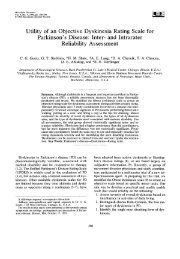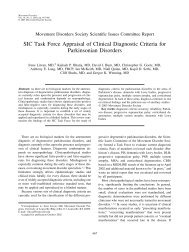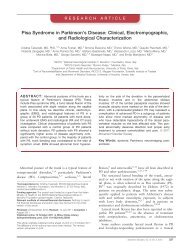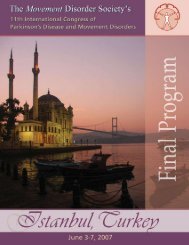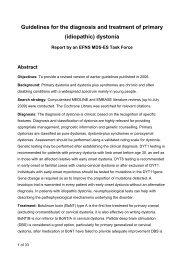15th INTERNATIONAL CONGRESS OF PARKINSON'S
15th INTERNATIONAL CONGRESS OF PARKINSON'S
15th INTERNATIONAL CONGRESS OF PARKINSON'S
You also want an ePaper? Increase the reach of your titles
YUMPU automatically turns print PDFs into web optimized ePapers that Google loves.
Daily Schedule<br />
Monday<br />
38<br />
Monday, June 6, 2011<br />
TICKET continued2208 Parallel Session<br />
2207 Parallel Session<br />
15:30 Motoric emergencies in parkinsonism<br />
Marco Onofrj<br />
Chieti, Italy<br />
16:10 Dystonic and ballistic emergencies<br />
Helio Teive<br />
Curitiba, Brazil<br />
16:50 Acute psychosis and delirium in movement disorders<br />
Kelvin Chou<br />
Ann Arbor, MI, USA<br />
At the conclusion of this session, participants should be<br />
better able to:<br />
1. Develop an approach to the management of motoric<br />
emergencies that occur in parkinsonism, including<br />
acute akinesia and severe dyskinesias<br />
2. Identify and learn to manage acute or severe<br />
manifestations of dystonia and ballism<br />
3. Discuss the causes and treatment of acute psychosis or<br />
delirium in movement disorders patients<br />
Recommended Audience: Clinical Academicians; Practitioners;<br />
Non-Physician Health Professionals; Students/Residents/Trainees<br />
TICKET<br />
2208 Parallel Session<br />
Non dopaminergic systems in Parkinson’s disease:<br />
From bench to bedside<br />
15:30 – 17:30<br />
Location: South Building, Level 700, Room 714AB<br />
Chairs: Stephen Kish<br />
Toronto, ON, Canada<br />
Etienne Hirsch<br />
Paris, France<br />
15:30 Do non-dopaminergic neurons degenerate in<br />
Parkinson’s disease? Lessons from postmortem studies<br />
Glenda Halliday<br />
Randwick, Australia<br />
16:10 Animal models for the understanding of dopaminergic<br />
resistant symptoms in Parkinson’s disease<br />
David Grabli<br />
Paris, France<br />
16:50 L-Dopa resistant symptoms in Parkinson’s disease<br />
patients: The needs of the clinicians<br />
Andrew Hughes<br />
Melbourne, Australia<br />
TICKET continued<br />
At the conclusion of this session, participants should be<br />
better able to:<br />
1. Describe the non-dopaminergic lesions in Parkinson’s<br />
disease<br />
2. List the animal models for studying dopaminergic<br />
resistant symptoms<br />
3. Discuss the difficulties in alleviating dopaminergic<br />
resistant symptoms in Parkinson’s disease<br />
Recommended Audience: Basic Scientists; Clinical<br />
Academicians; Practitioners;Non-Physician Health<br />
Professionals;Students/Residents/Trainees<br />
TICKET<br />
2209 Parallel Session<br />
Seminal topics in movement disorders as<br />
identified by the late David Marsden<br />
15:30 – 17:30<br />
Location: South Building, Level 700, Room 715AB<br />
Chairs: Stanley Fahn<br />
New York, NY, USA<br />
Yves Agid<br />
Paris, France<br />
15:30 The role of neuromelanin<br />
Andrew Lees<br />
London, United Kingdom<br />
16:10 Neuroplasticity and dystonia<br />
Angelo Quartarone<br />
Messina, Italy<br />
16:50 Descending pathways and motor control<br />
Roger Lemon<br />
London, United Kingdom<br />
At the conclusion of this session, participants should be<br />
better able to:<br />
1. Describe the significance of neuromelanin in<br />
movement disorders<br />
2. Identify the role of aberrant plasticity in dystonia<br />
3. Discuss modern concepts of motor pathways and<br />
motor control<br />
Recommended Audience: Basic Scientists; Clinical<br />
Academicians; Practitioners; Students/Residents/Trainees<br />
TICKET<br />
2210 Parallel Session<br />
Gilles de la Tourette syndrome<br />
15:30 – 17:30<br />
Location: South Building, Level 700, Room 717AB<br />
Chairs: Jonathan Mink<br />
Rochester, NY, USA<br />
Paul Sandor<br />
Toronto, ON, Canada


